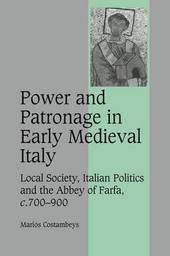
|
Power and Patronage in Early Medieval Italy: Local Society, Italian Politics and the Abbey of Farfa, c.700-900
Paperback / softback
Main Details
| Title |
Power and Patronage in Early Medieval Italy: Local Society, Italian Politics and the Abbey of Farfa, c.700-900
|
| Authors and Contributors |
By (author) Marios Costambeys
|
| Series | Cambridge Studies in Medieval Life and Thought: Fourth Series |
|---|
| Physical Properties |
| Format:Paperback / softback | | Pages:410 | | Dimensions(mm): Height 229,Width 152 |
|
| Category/Genre | Christianity |
|---|
| ISBN/Barcode |
9780521178303
|
| Classifications | Dewey:271.104563 |
|---|
| Audience | | Professional & Vocational | |
|---|
| Illustrations |
Worked examples or Exercises
|
|
Publishing Details |
| Publisher |
Cambridge University Press
|
| Imprint |
Cambridge University Press
|
| Publication Date |
3 March 2011 |
| Publication Country |
United Kingdom
|
Description
Founded around the beginning of the eighth century in the Sabine hills north of Rome, the abbey of Farfa was for centuries a barometer of social and political change in central Italy. Conventionally, the region's history in the early Middle Ages revolves around the rise of the papacy as a secular political power. But Farfa's avoidance of domination by the pope throughout its early medieval history, despite one pope's involvement in its early establishment, reveals that papal aggrandizement had strict limits. Other parties - local elites, as well as Lombard and then Carolingian rulers - were often more important in structuring power in the region. Many were also patrons of Farfa, and this book reveals how a major ecclesiastical institution operated in early medieval politics, as a conduit for others' interests, and a player in its own right.
ReviewsReview of the hardback: 'As its title implies, this book deals with a rather broad issue on several levels and as such might appear at first blush to be somewhat overreaching. However, as a result of his superb research, impeccable organization and disciplined writing style, Marios Costambeys, a Lecturer in History at the University of Liverpool, has been able to synthesize enormous amounts of data into a coherent and insightful study that remains faithfully within the parameters of its main thesis.' The Medieval Review '... careful work of scholarship. Costambeys writes in a clear and engaging style while his arguments are based on sound methodological groundwork.' Journal of Ecclesiastical History
|